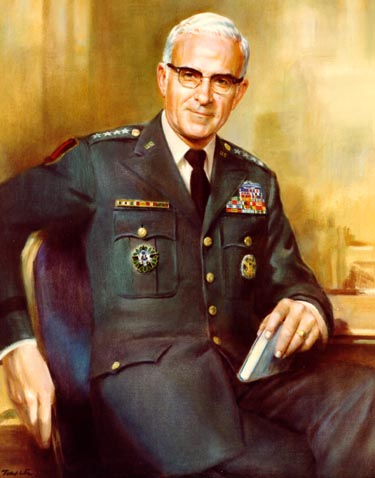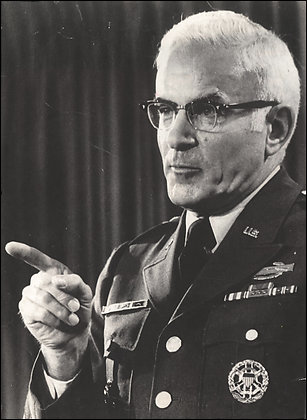General Bernard W. Rogers, 87; NATO Leader and Army Chief
Bernard W. Rogers, 87, a four-star general who introduced major reforms as Army chief of staff in the 1970s and who later was the top military commander of NATO, died October 27, 2008, at Inova Fairfax Hospital, Virginia, after a heart attack. He lived in McLean., Virginia.
After bringing changes in recruiting and training to an Army whose morale had been depleted by the Vietnam War, General Rogers became the longest serving military chief in NATO's six-decade history.
He strengthened the transatlantic military alliance's presence throughout Europe and, according to a 1985 Business Week article, was “widely viewed as the most effective NATO chief since the first, Dwight D. Eisenhower.”
He replaced Alexander M. Haig Jr. as Supreme Allied Commander in Europe in 1979 and was elected to an unprecedented four two-year terms as NATO's military leader. General Rogers repeatedly warned against relaxing Western military readiness in the face of what he saw as a powerful Soviet threat. He instituted a new doctrine of warfare emphasizing mobile, high-impact strikes that has since become a dominant military strategy.
General Rogers, in a 1979 photo, was once described “as the most effective NATO chief since the first, Dwight D. Eisenhower.”
When the Reagan administration signed a treaty with the Soviet Union requiring each side to withdraw intermediate-range missiles from Europe, General Rogers called the agreement “foolish.” He said the Warsaw Pact's superiority in foot soldiers and conventional weapons left NATO forces at risk of being quickly overrun.
His stance drew a pointed rebuke in 1987 from Secretary of State George P. Shultz, who called the general's comments “way out of line.” General Rogers soon retired.
General Rogers, who spent 44 years in uniform, had an unusual combination of talents as a combat commander, intellectual and statesman. While addressing a NATO conference in 1979 the former Rhodes scholar said, “One cannot help but to be impressed — perhaps depressed is the better word — by the folly, futility and waste of war as a means of resolving man's problems.”
Bernard William Rogers was born June 16, 1921, in Fairview, Kansas, and graduated in 1943 from the U.S. Military Academy at West Point, where he was elected First Captain of cadets.
After World War II, he was briefly an aide to General Mark Clark, the commander of U.S. forces in Austria. In 1947, General Rogers received a Rhodes scholarship to England's University of Oxford, from which he received bachelor's and master's degrees in economics and philosophy.
He was a decorated infantry commander in the Korean War and held intelligence positions before becoming executive officer to Maxwell D. Taylor, Chairman of the Joint Chiefs of Staff, in 1962.
As assistant commander of the First Infantry Division in Vietnam in 1966 and 1967, General Rogers was awarded the Distinguished Service Cross — the Army's highest award for valor after the Medal of Honor — for leading a successful counterattack against a Vietcong raid on a South Vietnamese special forces camp. He rallied troops on the ground and personally scouted enemy positions from a low-flying helicopter under heavy fire.
After two years as Commandant of the Corps of Cadets at West Point, General Rogers took command of the Fifth Infantry Division in Fort Carson, Colorado, in 1969. At a time of falling morale, he made sweeping changes in the daily routine of soldiers by abolishing kitchen duty (KP), reveille, roll call and Friday night “GI parties,” in which soldiers scrubbed the barracks for Saturday inspections.
He established councils for junior officers, enlisted men and racial minorities to express their concerns and set up a Greenwich Village-style coffeehouse, complete with folk singers. Old-line officers were aghast, but enlistments soared, and General Rogers became known as one of the brightest thinkers in the Army. He continued the reforms as Army chief of staff from 1976 to 1979, improving training programs and developing plans for a modern “quick-strike” force. He also took steps to make the Army more friendly toward women and minorities, calling on commanders to “eliminate any discriminatory handling of soldiers.”
Despite his charmed career, General Rogers was eager to leave the bureaucratic labyrinth of the Pentagon behind when he assumed his NATO post in Belgium.
“You've heard that phrase from a country song that goes: ‘Happiness is Lubbock, Texas, in the rearview mirror'?” he said. “Well, for me, happiness is the Pentagon in the rearview mirror.”
General Rogers could be General Rogers could be “suave and poised and intimidating,” Major General Dewitt C. Smith once said, but he was also known to break into song on occasion, with Frank Sinatra's “My Way” a particular favorite.
Besides the Distinguished Service Cross, General Rogers's decorations included the Defense Distinguished Service Medal, the Silver Star, four awards of the Legion of Merit and three awards of the Distinguished Flying Cross.
After his retirement in 1987, he was a director of the Council on Foreign Relations and the Atlantic Council of the United States. He served on the boards of the USO and the Association of the U.S. Army and was a consultant and director to several companies, including Coca-Cola and General Dynamics.
Survivors include his wife of 63 years, Ann E. Rogers of McLean; three children, retired Army Colonel Michael W. Rogers of Manassas, Diane Opperman of Arlington and Susan Kroetch of Alexandria; a sister; a brother; six grandchildren; and three great-grandchildren.
ROGERS, BERNARD WILLIAM
DISTINGUISHED SERVICE CROSS
Citation:
The President of the United States takes pleasure in presenting the Distinguished Service Cross to Bernard William Rogers (0-25867), Brigadier General, U.S. Army, for extraordinary heroism in connection with military operations involving conflict with an armed hostile force in the Republic of Vietnam, while serving with Headquarters, 1st Infantry Division.
Brigadier General Rogers distinguished himself by exceptionally valorous actions on 10 March 1967 while serving as Assistant Division Commander, 1st Infantry Division during a Viet Cong attack on a Vietnamese Special Forces camp at Cau Song Be.
Upon being notified that the Vietnamese camp was under attack, he immediately flew to the area. General Rogers made several low helicopter passes over the besieged camp, despite intense hostile fire, to investigate the strength and disposition of the Viet Cong forces. He alerted nearby artillery and aircraft bases and then landed in the beleaguered camp amidst an enemy mortar barrage. He conferred with the ground commander, assessed the battle situation, and mapped a plan of defense.
Exposing himself constantly to the insurgents' fire, he supervised the positioning of the defenders on the perimeter and adjusted artillery and air strikes. General Rogers' willingness to risk his life for the Vietnamese soldiers and their camp inspired the men to fight with renewed vigor. Returning to his helicopter, he made additional passes over the area to further assess the situation and to ensure that the Viet Cong positions had not changed. Flying at extremely low levels, he accurately marked the enemy concentrations with smoke grenades to aid incoming support aircraft in locating their targets. However, the fighter pilots were unable to see the smoke well enough because of the darkness and dense jungle foliage. General Rogers directed his pilot to maneuver over the insurgents at minimum altitude while the door gunner marked the targets with tracer rounds from his machine gun, enabling the supporting aircraft to inflict heavy casualties on the enemy. When the Viet Cong broke contact and began to retreat, General Rogers directed additional air strikes on them, inflicting further casualties.
His dynamic leadership, outstanding tactical ability and unparalleled courage were responsible for the overwhelming defeat of the insurgent forces. Brigadier General Rogers' extraordinary heroism and devotion to duty were in keeping with the highest traditions of the military service and reflect great credit upon himself, his unit, and the United States Army.
Headquarters, US Army, Vietnam, General Orders No. 4124 (August 14, 1967)
Michael Robert Patterson was born in Arlington and is the son of a former officer of the US Army. So it was no wonder that sooner or later his interests drew him to American history and especially to American military history. Many of his articles can be found on renowned portals like the New York Times, Washingtonpost or Wikipedia.
Reviewed by: Michael Howard


